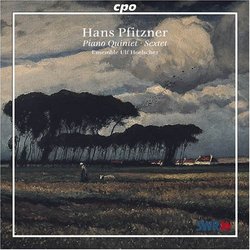| All Artists: Pfitzner, Ensemble Ulf Hoelscher Title: Hans Pfitzner: Piano Quintet; Sextet Members Wishing: 0 Total Copies: 0 Label: Cpo Records Original Release Date: 1/1/2009 Re-Release Date: 2/24/2009 Genre: Classical Styles: Chamber Music, Historical Periods, Classical (c.1770-1830) Number of Discs: 1 SwapaCD Credits: 1 UPC: 761203739523 |
Search - Pfitzner, Ensemble Ulf Hoelscher :: Hans Pfitzner: Piano Quintet; Sextet
CD Details |
CD ReviewsA Lovable Sextet and a Less Successful Piano Quintet by Pfit J Scott Morrison | Middlebury VT, USA | 02/25/2009 (4 out of 5 stars) "I yield to no one in my admiration for Pfitzner's lovely if occasionally pedantic opera 'Palestrina' Hans Pfitzner: Palestrina. But Hans Pfitzner (1869-1949) was an inconsistent composer. His oeuvre has such near-misses as his Christmas fairy-tale 'Christelflein' Hans Pfitzner: Das Christelflein with its opaque (or perhaps laughable is the better term) libretto and its acres of German dialog, difficult at best for non-German speakers. And that inconsistency is illustrated in this release from cpo.
There are two works here from the opposite ends of Pfitzner's composing career. The Quintet, Op. 23, for piano and string quartet, is from 1908 and shows Pfitzner at his most hyperchromatic. It's a gargantuan work, clocking in at forty-five minutes. The long first movement is filled with clotted and anguished chromatic harmonies and undistinguished motivic materials. The Intermezzo, on the other hand, has lovely melodies and delightful pizzicato or staccato accompaniments. It feels as if it doesn't really belong in the same work as Movement I. In places it reminds me of the pseudo-baroquisms of Richard Strauss's 'Bourgeois Gentilhomme.' The Adagio, even longer than the first movement at seventeen minutes, contains a funeral march -- not surprising, since Pfitzner had often declared his fondness for the first piano quintet ever to enter the repertoire, the Schumann which also has a funeral march movement. But the movement also has slow and soulful lyrical sections that surround the march elements. The effectiveness of this movement is etiolated somewhat by its harmonic vagueness. The finale, Gemächlich bewegt, again sounds as if it came from some source unrelated to the rest of the quintet. It is a blithely carefree student song reminiscent of 'Ein Jäger aus Kurpfalz'. Although Pfitzner was nearly forty when he wrote the Quintet, the work has the feel of a student work, with its mis-assembled pieces. This is not to say that there aren't very enjoyable parts of the whole, but the thing doesn't quite hold together. On the other hand, the Sextet, Op. 55 in G Minor, for clarinet, violin, viola, cello, double bass, and piano, is a little masterpiece, a jolly divertimento. It dates from 1946 and is in five movements, and lasts only twenty-five minutes. The unusual combination of instruments works wonderfully; Pfitzner makes particularly effective use of the clarinet in the ensemble. The first movement is a sonata-allegro with especially winsome themes that are skillfully developed. The Quasi-Minuetto is almost a classical-era miniature but it contains an unexpected little waltz and ends with a surprisingly un-Mozartean stretto. The Rondoletto is an outdoor-piece that could almost have been written by Schubert except for its startlingly effective modulations and its creative changes of instrumental combinations. The fourth movement, Semplice misterioso, is in strophic songform, with varying intermezzi between stanzas. It leads without pause into the finale, Comodo, which alone among all the movements features a number of double bass solos, played beautifully here by Christoph Schmidt. The movement reintroduces motifs from earlier in the work, albeit in varying form, and it builds to a joyful conclusion. This work, unlike the Quintet, holds together, making the sum greater than its parts. This is a piece which, except for its unusual instrumentation, might well have a place in the international chamber music repertoire. Ulf Hoelscher, the violinist who leads this ensemble, is a musician noted for his musicianship and discerning taste and we are not disappointed here. His colleagues include Mayra Salinas, violin; Roland Glassl, viola; Gustav Rivinius, cello; Christoph Schmidt, double bass; Wolfgang Meyer, clarinet; and Ian Fountain, piano. One could hardly ask for better performances. Scott Morrison" |

